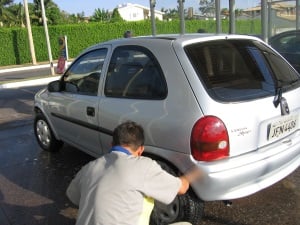Wait! Should you buy a used car? Check out these signs you shouldn't.
It’s well established that buying a new car does not make financial sense. You spend $25,000 on the car and then see its value drop 25% as soon as...
3 min read
Erik Bjornstad : Mar 18 2016

With the summer months approaching, your car or truck AC system becomes a priority. It has to work well in the hot weather. This is especially true in the southern states where the humidity can sometimes be unbearable. Here in Florida, nobody is crazy enough to go without air conditioning.
There are a number of visual checks and a few manual procedures that can be done by most individuals with little mechanical ability. And there are other AC-related things that may not be advisable to try on your own. Which one can you handle on your own?
All air conditioning systems in vehicles need to be run weekly during the non-air conditioning months, even in cold weather. It only takes about ten minutes. Doing this will circulate the oil in the system, keeping the seals lubricated, preventing them from drying out, and causing the Freon to leak out. Running the air conditioner will also dry out the air chambers and reduce the chances of fungus and mold growing in them and causing undesirable odors.
It’s wise to look over things on your AC system every once in a while. We’ll talk about some of the parts you should pay attention to, but don’t let that make your eyes glaze over. There are three primary parts you need to check. Let’s run through them.
When you pop your hood, start with a visual inspection – what a mechanic would start by doing. Check the A/C condenser (part #1) located in front of the radiator. The condenser is where Freon is turned from a gas back to a liquid. It should be free of anything that would restrict the flow of air through it. If the condenser is restricted, the efficiency of the air conditioner will be reduced. If needed, you can easily clean the condenser with a garden hose and a high-pressure nozzle.
The next item to look at is the engine fan (part #2), which can be mechanical or electrical. If you have an electric cooling fan mounted to the radiator, it should be running at all times when the air conditioner is in the on position. If it’s not running when it’s supposed to, high pressure can build up in the system and cause a burst hose, losing all of the Freon and oil in the system. Some systems have two electric fans; only one of them needs to be running when the air conditioning system is on. If you are driving your vehicle and the temperature of the air coming from the air ducts is cold but rises considerably when the engine is idling, this is a good indication the cooling fan is inoperative.
The other kind of fan is a mechanical clutch fan. These are made with a thermostat in the center that is supposed to tighten up and spin faster when the air coming through the condenser and the radiator heats up.
With both of these, you want to do a quick test to check the condition of the fan clutch. With the engine off, reach in and manually turn the fan. You should feel resistance or drag as you are rotating it. If it’s loose and spins freely, then the chances are you have a defective fan clutch.
Next, visually check the underside of the fan belt (part #3) for cracks. If you find any, the belt should be replaced. Older vehicles used to have a belt tension gauge that was used during belt replacement to prevent excessive pressure on system components. Today’s newer vehicles have a spring-loaded tensioner that applies the correct amount of pressure.
Once you’ve checked all this, now check the operation of the overall system. When you start the engine and fire up the cold air, you’ll see the compressor clutch cycling off and on about every 30 seconds. If it’s cycling at a much faster rate than that, say, every couple of seconds, this is a good indicator your AC system is low on Freon.
Air conditioning systems will lose 10% to 15% of their Freon in a year. This is where you will want to use the services of a trained professional. Every air conditioning system has an exact amount of Freon that should be in the system. If you think the problem is simply that the system is just low on Freon, you do not want to add it yourself. There is no way of knowing how much Freon is still in your system, and if you add too much you run the very real risk of damaging the compressor or causing a pressure buildup in the system which can cause one of the hoses to burst.
Beware of the do-it-yourself recharge kits that can be purchased from most parts stores. You must remember that there can be other reasons besides the loss of Freon that might cause an air conditioner to become inoperative. If you mistakenly add Freon to a full system, it can cause the destruction of the compressor because of liquid Freon entering it. Or you can blow a system hose. And if you try to do it yourself without safety glasses and you have an accident, Freon can get in your eyes and cause instant blindness. Not something you want to mess around with. Better to let the trained professionals handle that one.
It’s wise to inspect and service your air conditioning system before you get to the heat of summer when the shops that service air conditioners are backed up. You’ll save money if you stay ahead of your AC maintenance because people have a tendency to spend more money than necessary when they’re in a bind.

It’s well established that buying a new car does not make financial sense. You spend $25,000 on the car and then see its value drop 25% as soon as...

Following up on our previous post about premium gas containing ethanol (or not), there are lots of people out there who swear by using premium gas....

Washing, wax, vacuum the interior. Make the tires shine. Clean the windows. Refill the washer fluid. What kind of things do you include in your car...